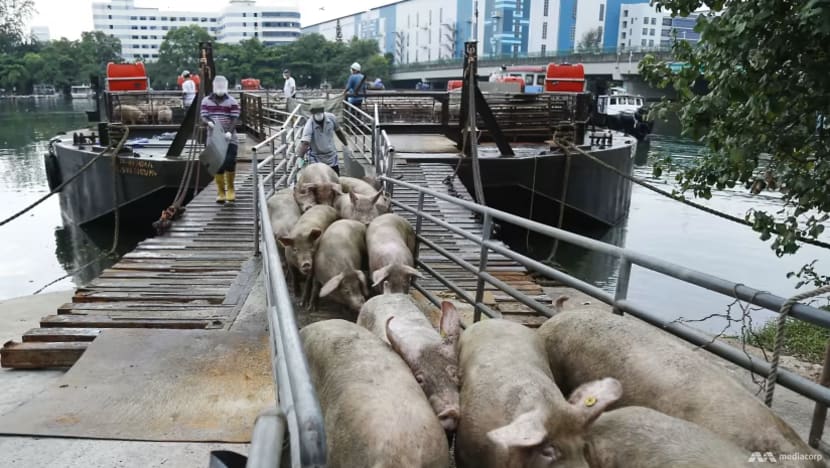Singapore halts import of live pigs from Pulau Bulan after African swine fever detected in carcasses

File photo of pigs from Pulau Bulan arriving in Singapore. (Photo: TODAY/Najeer Yusof)
SINGAPORE: Singapore has stopped the import of live pigs from Pulau Bulan in Indonesia after African swine fever was detected in some pig carcasses.
The Singapore Food Agency (SFA) said on Thursday (Apr 20) that the carcasses were from a consignment of live pigs from Pulau Bulan. They have been removed from the abattoir line.
SFA has halted the imports while investigations are ongoing.
"Due to the current situation, there will be temporary disruptions to the supply of freshly slaughtered pork from Apr 23 onwards," said the food agency.
"SFA is working closely with the abattoir to sanitise the premises and surrounding environment after the slaughter of pigs that are currently at the abattoir has been completed, as well as to maintain the biosecurity measures at the abattoir."
It added that pork in Singapore is safe for consumption, as African swine fever does not affect humans and is not a food safety concern.
Pigs that are not sick and have passed SFA's inspections can be eaten, it said.
"SFA and the Animal & Veterinary Service ... will continue to monitor the situation closely," said the agency.
AFRICAN SWINE FEVER
While African swine fever is a highly virulent and contagious disease in pigs, it does not infect humans, said SFA.
To mitigate the risk of incursion of African swine fever, SFA requires regions exporting raw pork to Singapore to be free from the disease as raw meat from infected pigs is a possible vehicle of transmission of the virus.
Processed pork products from approved establishments in areas affected by African swine fever are allowed to be imported and sold, provided they have been "heat-treated to inactivate" the virus, said SFA.
"Singapore’s import conditions for pigs, pork and pork products are based on science, and take reference from guidelines and standards from the World Organisation for Animal Health," the agency added.
DIVERSIFICATION OF PORK SOURCES
Live pigs from Pulau Bulan make up about 15 per cent of Singapore's total pork supply. The country's pork supply is "well diversified" with more than 20 sources, said SFA.
These include live pigs from Sarawak and chilled or frozen pork from Australia, Brazil, Denmark and New Zealand.
"We will work with the industry to increase chilled and frozen pork from other sources," said SFA.
It added that diversification remains a key food security strategy for Singapore. It reduces the impact of disruption from any single source as importers can turn to alternative sources quickly to stabilise Singapore's food supply.
"Food supply disruptions can occur from time to time. Consumers are encouraged to be flexible and adaptable with our choice of food," said SFA.
The agency advised consumers to choose a variety of food types from different sources. They can also opt for frozen or chilled pork, as well as other forms of meat.
"There will be ample supplies for everyone if we buy responsibly and do not hoard," said the food agency.
Last June, Malaysia imposed a ban on chicken exports to ensure sufficient supply in its domestic market. The ban was lifted in October.
Singapore also approved Indonesia as a new source for the import of chilled, frozen and processed chicken.













